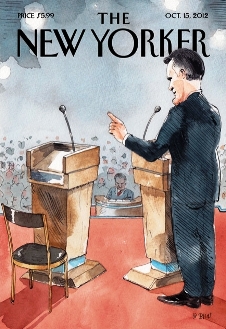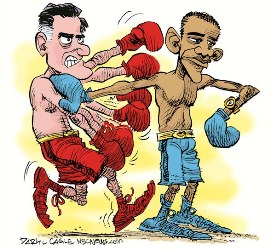
My favorite quote of the past month came from a pollster who had watched Mitt Romney’s post-convention fall and post-debate rise — and had withstood all the attendant Republican whining about supposedly skewed party-ID samples. ”When you give conservatives bad news in your polls, they want to kill you,” the pollster said. ”When you give liberals bad news, they want to kill themselves.”
True enough — I know that I personally stood on the ledge from the first Rombama debate straight through Biden’s first soul-replenishing cackle last Thursday. Liberals are considerably less suicidal at the end of this week, following Tuesday’s slugfest and its exposure of Romney’s soft underbelly on taxes and binders and whatnot. Still, the polls are uncomfortably tight, if not quite alarming (yet – I continue to pray for serenity at the altar of Nate Silver). And we’re just two weeks removed from feeling as though the bottom had fallen out from under President Obama’s re-election bid.
 Have we been worried for the right reasons? Our wailing and gnashing of teeth has centered primarily on Obama’s sluggish performance in that first debate — his failure to bring up Romney’s comment about the 47 Percent, his failure to match Mitt’s alpha-dog attitude on the split screen, etc. The excuses were legion, from altitude issues to pre-anniversary-sex jitters. (Or maybe it was post-coital weariness? Was coach always right when he told us to ”save it for the game”?). But it seems to me the problem was more deep-seated than any of that, and might be traceable all the way back to the Obama campaign’s first decisions when it became clear Romney would be the Republican nominee.
Have we been worried for the right reasons? Our wailing and gnashing of teeth has centered primarily on Obama’s sluggish performance in that first debate — his failure to bring up Romney’s comment about the 47 Percent, his failure to match Mitt’s alpha-dog attitude on the split screen, etc. The excuses were legion, from altitude issues to pre-anniversary-sex jitters. (Or maybe it was post-coital weariness? Was coach always right when he told us to ”save it for the game”?). But it seems to me the problem was more deep-seated than any of that, and might be traceable all the way back to the Obama campaign’s first decisions when it became clear Romney would be the Republican nominee.
Last winter and spring, at the beginning of their quest to define their opponent before he could define himself to the voters, the President and the Davids (Axelrod, Plouffe) first had to choose their definition of the guy. Which of The Two Romneys would they turn into a bogeyman? Would it be the Multiple-Choice Mitt of his career in Massachusetts politics, a serial panderer and Etch-a-Sketch artist who seemed ideologically rudderless (in the same way the Bushies made his state’s last presidential nominee appear)? Or would it be the Severe Conservative of the GOP primaries, who scrambled to the right of secessionist Rick Perry on immigration and later bought off the Tea Party’s skepticism while spending his wacked-out rivals into oblivion?
The Obamans chose the latter, of course, and spent the next six months (and a couple hundred million bucks) convincing undecided voters that Mitt had been permanently possessed by an unholy offspring of Grover Norquist and Rick Santorum. It seemed to be working pretty well, too — helped along by a multitude of malapropisms on Romney’s part, from ”I like to be able to fire people” to the 47 Percent comments and a few dozen other unforced errors. But even as Obama worked the extremism angle, Multiple-Choice Mitt was always there in the background, occasionally letting his moderate freak-flag fly until his base reined him in with their teabag strings. That’s the Mitt who remained a beloved target elsewhere in the political culture.
And then, over the course of 90 minutes in Denver on Oct. 3, Romney cut those strings and forcefully exorcised his far-right demons. In front of the biggest audience he’ll get during the whole campaign, he meticulously (if bogusly) claimed what sounded an awful lot like the political center, while Obama failed utterly to force Mitt back into the wingnut box his campaign had built for him. Republicans cheered Romney’s sudden decision to go rogue against their orthodoxy, since it’s clearly the only shot they have left of taking back their country, while a nation of ADHDecideds cried, ”Wait a minute, Mr. President! This isn’t the guy you told us he was! And after invading every commercial break for six months with tales of Attila the Hun, tonight you’re not even trying to refute him!”
 As the polls shifted seismically over the following week, Democrats flailed about with our Big Bird jokes (when we weren’t passing around the hemlock). Obama began mocking his own performance to comfort us. And eventually we chose to hope against hope that this was all a speed bump, an aberration, and that Joe Biden would turn on his working-man charm and save liberalism from extinction (heaven help us). What we didn’t do so much was consider the more substantive nature of Obama’s failures in Denver: that he had invested too heavily in perpetuating his campaign’s far-right definition of his opponent — at the expense of perfecting a defense of his own record, or identifying a compelling second-term agenda — and that he therefore seemed so flummoxed that he couldn’t pivot when the wrong Romney showed up.
As the polls shifted seismically over the following week, Democrats flailed about with our Big Bird jokes (when we weren’t passing around the hemlock). Obama began mocking his own performance to comfort us. And eventually we chose to hope against hope that this was all a speed bump, an aberration, and that Joe Biden would turn on his working-man charm and save liberalism from extinction (heaven help us). What we didn’t do so much was consider the more substantive nature of Obama’s failures in Denver: that he had invested too heavily in perpetuating his campaign’s far-right definition of his opponent — at the expense of perfecting a defense of his own record, or identifying a compelling second-term agenda — and that he therefore seemed so flummoxed that he couldn’t pivot when the wrong Romney showed up.
But was the first (and second) debates’ Moderate Mitt, in fact, the wrong Romney? Why was it such a surprise when he began insisting he didn’t have a deficit-exploding tax-cut plan, or that he didn’t intend to turn Medicare into vouchers, or that he thinks highly of teachers? After all, those positions were three of the many self-contradicting sides Mitt has taken on just about every issue over the last year and a half. How could Obama be so unprepared for that shift to the middle? Indeed, shouldn’t he have been warning voters of Mitt’s ideological wanderlust all along?
Yes, he should have. As it turned out, painting Romney as a conservative extremist this whole time was like lobbing a slow-pitch softball over the plate — a pitch that didn’t arrive until Denver, where Romney clobbered it. I’ve felt throughout the year that, even though running against Madman Mitt was a simpler case to build and might resonate more strongly with the Democratic base, it carried the inherent risk of being true only half the time. On the other hand, running against Multiple-Choice Mitt would have been a steeper climb — in part because it would have been reminiscent of George Bush’s 2004 campaign, which Democrats loathed, and in part because it’s tougher to excite your base with exhortations to reject the other guy because, y’know, we really have no idea what, if anything, he believes.
 But that’s the actual Romney — not a strident conservative, nor merely a run-of-the-mill flip-flopper, but a malignant shape-shifter with no apparent principles beyond the hoarding of money and prolific procreation. Yes, running against that Mitt would have required a more nuanced series of arguments — and probably would have required the president to delineate how the past four years, and his vision for the next four, positively reflect concrete values in which Obama demonstrably believes. But I’m convinced that such a re-election campaign would have succeeded at least as well as the current one — and it certainly would have made the deflation of Denver, and the subsequent tightening of the polls, far less likely.
But that’s the actual Romney — not a strident conservative, nor merely a run-of-the-mill flip-flopper, but a malignant shape-shifter with no apparent principles beyond the hoarding of money and prolific procreation. Yes, running against that Mitt would have required a more nuanced series of arguments — and probably would have required the president to delineate how the past four years, and his vision for the next four, positively reflect concrete values in which Obama demonstrably believes. But I’m convinced that such a re-election campaign would have succeeded at least as well as the current one — and it certainly would have made the deflation of Denver, and the subsequent tightening of the polls, far less likely.
Obama wouldn’t even have needed to change his lines of attack on taxes, Medicare, immigration and women’s issues all that much — he merely would have needed to refocus them. You know those ”word clouds” that are so popular these days, the ones that reveal the themes in a speech by identifying its most frequently used words in descending type sizes? Well, the word clouds for Obama’s debate performances (as well as his convention speech) have missed almost entirely a phrase that I wish would trip off his tongue on a perpetual loop: ”Republican Congress.”
There is no entity in American politics, and perhaps in American culture in general (apart from various serial killers and maybe Paris Hilton), that is less popular than the Republican Congress. (That includes the Senate, which, though nominally run by Democrats, has been held hostage by GOP filibusters ever since Scott Brown replaced Ted Kennedy.) The Republican Congress is the shit-stain on the nation’s economic Jockey shorts, responsible for the debt-ceiling debacle and the downgrade of our credit rating, the foiled Obama-Boehner ”grand bargain” and the failed ”supercommittee,” the looming budget ”sequester” and the blockage of Obama’s entire job-creation agenda. It is the home of Todd Akin and Paul ”evolution is a lie straight from the pits of hell” Broun, of Jim DeMint and James Inhofe … of Paul Ryan, who never could have been chosen as Romney’s running mate had Obama spent the summer arguing that Ryan would make a weak-willed President Romney his bitch.
 The Republican Congress is, in short, extremist and dim-bulbed and reviled enough to sink Romney all by itself, if only Obama would allow it. Yes, I’m suggesting that a ”Give Em Hell, Harry” campaign would have been preferable to the current one. Here is its central logic: “This guy Mitt Romney is a cypher, a weak and character-free man who takes every side of every issue and therefore is not credible on any issue at all. (Imagine the hilarious Mitt-vs.-Mitt TV ads!) We have no idea what his actual beliefs are, so we have no idea what he’d actually want to do once in office. We do know all about the Republican Congress, however. We know they’re a bunch of know-nothing, extremist bullies who would steamroll a wimpy GOP president like Mitt Romney and force him to swallow every morsel of nutty Tea Party legislation. Heck, Grover Norquist already made it crystal clear when he said this summer, ‘We are not auditioning for a fearless leader. We don’t need a president to tell us what direction to go … We just need a president to sign this stuff … a Republican with enough working digits to handle a pen.’ We all (well, 93 percent of us) hate the Republican Congress — do you really want to give them that kind of power?”
The Republican Congress is, in short, extremist and dim-bulbed and reviled enough to sink Romney all by itself, if only Obama would allow it. Yes, I’m suggesting that a ”Give Em Hell, Harry” campaign would have been preferable to the current one. Here is its central logic: “This guy Mitt Romney is a cypher, a weak and character-free man who takes every side of every issue and therefore is not credible on any issue at all. (Imagine the hilarious Mitt-vs.-Mitt TV ads!) We have no idea what his actual beliefs are, so we have no idea what he’d actually want to do once in office. We do know all about the Republican Congress, however. We know they’re a bunch of know-nothing, extremist bullies who would steamroll a wimpy GOP president like Mitt Romney and force him to swallow every morsel of nutty Tea Party legislation. Heck, Grover Norquist already made it crystal clear when he said this summer, ‘We are not auditioning for a fearless leader. We don’t need a president to tell us what direction to go … We just need a president to sign this stuff … a Republican with enough working digits to handle a pen.’ We all (well, 93 percent of us) hate the Republican Congress — do you really want to give them that kind of power?”
I’m quite certain that there is a mountain of focus-group research somewhere that refutes my hypothesis — Axelrod and Plouffe can’t be stupid enough to have picked the wrong strategy entirely. And by now, of course, we’re certainly too far downstream for Obama to change horses and run against Milquetoast Mitt and the Republican hordes … Or are we? After all, Romneybot switched out his motherboard effectively in early October — why can’t Obama throw up his hands during the last debate, lay out Mitt’s 20 different (and mostly dissembling) positions on Libya and Syria and other hotspots, and loudly ask, ”Somebody please tell me — who IS this guy?”
It’s the question that folks inside the Republican Party asked for over a year, as they toyed with Michele Bachmann and Rick Perry and Herman Cain and Newt Gingrich and Rick Santorum. It’s the question that independents ought to be asking themselves right now. Unfortunately, it hasn’t been Obama’s question of choice — and that choice may yet prove his undoing.





Comments